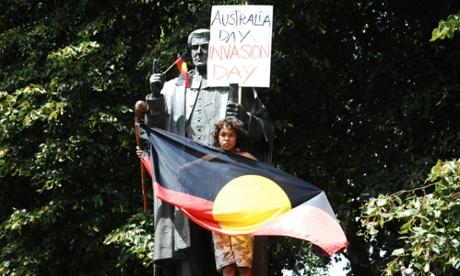Submitted by Paul Daley on

In 1988 my eldest child was born and later presented with a special bicentennial birth certificate. This happened just months after thousands of Indigenous Australians marched in protest of Australia Day, as the tall ships in Sydney Harbour simultaneously re-enacted what Aboriginal leaders called “Invasion Day”.
I was aware of tragedies such as those that befell the stolen generations, and I sympathised broadly with Aboriginal land rights issues. Colonial settlement was a brutal process, to be sure, but for the most part I – like many other white Australians of European descent – did not fully realise the extreme acts of violence that came with it.
Watching the 1988 march on TV prompted an awakening of sorts in me and, I suspect, many others as well.
I concluded some time ago now that those who regard Australia Day as Invasion Day are right; the early governors such as Lachlan Macquarie viewed their conflict with the Aboriginal people as war and the terrible, orchestrated violence against our Indigenous people lingered well into the 20th century.
Most Australians don't know – or don't want to know – about the extent of the violence that accompanied European colonial settlement and that is still synonymous for black Australia with Australia Day.
Thirty years after Arthur Phillip sailed into Sydney Cove on 26 January 1788, it was left to Macquarie to celebrate this special anniversary for British colonialism.
In three short decades successive governors, British soldiers and convicts had done much to tame the inhospitable wilderness immediately around Botany Bay, while pushing pastoral settlement further towards the heart of Captain Cook's great southern land.
Macquarie – widely considered one of the more progressive early governors, not least in relation to making this land an economic asset for the empire and for his treatment of the colony's Aboriginal people – called the colony's celebration of itself “foundation day”.
By that first celebration of foundation day, Macquarie had already lost his patience with the local Indigenous people because of the threat they posed to the empire's new pastoral frontier by stealing stock and attacking the settlers who had taken their traditional lands.
In 1816 he’d ordered his troops to attack the Aboriginal people at Cow Pastures, south of Sydney, where they'd been playing havoc with the stock runners. Those who did not surrender as “prisoners of war”, Macquarie ordered, should be killed and the males hung up on trees as an example to others. It was a massacre.
It's salient that we remember, I think, that foundation day was Macquarie's idea and that it long ago morphed into Australia Day – the day when we, too, throw a giant party for ourselves on the anniversary of white European settlement.
The Australian flag – with its Union Jack – has become central to that celebration, fetishised into patterns on our boardies and bikinis, stubby holders, car mirror covers and surf mats. Buy a slab – get your free car flags! On Australia Day the flag is as much a potent symbol of ugly You Flew Here We Grew Here nationalism and territorial exclusion as generous patriotic pride. For many Indigenous Australians the Union Jack above our Southern Cross, meanwhile, still just symbolises occupation.
That is why Australia Day remains, as it stands, for far too many, too divisive a day to wholeheartedly celebrate nationhood.
Can we have an Australia Day when our nationhood is celebrated in a spirit of genuine reconciliation, when acknowledgement of past wrongs is accompanied by a monumental gesture of racial progress? A day when the citizenship ceremonies we celebrate and the paeans to the land and our luck within it are marked by peace and inclusion rather than just the anniversary of the start of sustained conflict?
It may not be too late for a gracious act of reconciliation to recast Australia Day.
Last year, while opposition leader, Tony Abbott said the failure to make peace with the first Australians was “a stain on our soul”.
And he insists his government will ensure that the Australian constitution acknowledges this land's Indigenous people. Any initiative that genuinely furthers that ambition this Sunday would be a remarkable step for reconciliation that could significantly redefine Australia Day.
So, too, would the choice of the Sydney Swans legend Adam Goodes as Australian of the Year.
Goodes said of Australia Day: "Australia Day to me – it's not a great day for me, to be honest. It's a day that I have turned into a bit of a celebration – Aboriginal people are still here, we've adapted, we've moved on, we're not focused on all of the bad things that have happened to our people but we're celebrating our culture ... and, you know, we are not going anywhere. That, to me, is what Australia Day means – it's a celebration that us as Indigenous people are still here, the longest surviving culture in the world, and that should be celebrated."
From little things . . .
- Log in to post comments